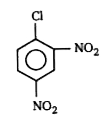Which one of the following compounds is least reactive with water?
CH3−O∣∣C−Cl
C6H5−O∣∣C−NH2
CH3−O∣∣C−NH2
C6H5−O∣∣C−Cl
The correct Answer is:B
To determine which compound is least reactive with water, we need to analyze the compounds based on their ability to undergo hydrolysis, which is a nucleophilic substitution reaction. The key factors influencing this reactivity are the nature of the leaving group and the stability of the resulting species after the leaving group departs.
1. Identify the Compounds:
Let's assume the given compounds are:
- Compound A: R-Cl (where R is some alkyl or aryl group)
- Compound B: R-NH2
- Compound C: C6H5-CONH2 (an amide with a phenyl group)
- Compound D: CH3-CONH2 (an amide with a methyl group)
2. Understand the Role of Leaving Groups:
In nucleophilic substitution reactions, the leaving group is crucial. A better leaving group will facilitate the reaction more readily. In general, halides (like Cl-) are better leaving groups than amines (like NH2).
3. Compare Leaving Groups:
- Chlorine (Cl-) is a good leaving group.
- Amines (NH2) are not as good leaving groups because they are less stable when they leave.
4. Evaluate the Compounds:
- For compounds with Cl (like Compound A), the reaction with water will be more favorable due to the good leaving ability of Cl-.
- For compounds with NH2 (like Compound B, C, and D), we need to analyze further.
- Among the amides, C6H5-CONH2 has resonance stabilization due to the phenyl ring, which makes the NH2 group less likely to leave compared to CH3-CONH2, which has less resonance stabilization.
5. Determine the Least Reactive Compound:
- Since C6H5-CONH2 has significant resonance stabilization that restricts the NH2 group from leaving, it will be the least reactive with water.
- CH3-CONH2, while also having an NH2 group, does not have the same level of resonance stabilization as C6H5-CONH2, making it more reactive than the former.
6. Conclusion:
Therefore, the compound that is least reactive with water is C6H5-CONH2 (option 2).
Final Answer:
The least reactive compound with water is C6H5-CONH2.
Let's assume the given compounds are:
- Compound A: R-Cl (where R is some alkyl or aryl group)
- Compound B: R-NH2
- Compound C: C6H5-CONH2 (an amide with a phenyl group)
- Compound D: CH3-CONH2 (an amide with a methyl group)
In nucleophilic substitution reactions, the leaving group is crucial. A better leaving group will facilitate the reaction more readily. In general, halides (like Cl-) are better leaving groups than amines (like NH2).
- Chlorine (Cl-) is a good leaving group.
- Amines (NH2) are not as good leaving groups because they are less stable when they leave.
- For compounds with Cl (like Compound A), the reaction with water will be more favorable due to the good leaving ability of Cl-.
- For compounds with NH2 (like Compound B, C, and D), we need to analyze further.
- Among the amides, C6H5-CONH2 has resonance stabilization due to the phenyl ring, which makes the NH2 group less likely to leave compared to CH3-CONH2, which has less resonance stabilization.
- Since C6H5-CONH2 has significant resonance stabilization that restricts the NH2 group from leaving, it will be the least reactive with water.
- CH3-CONH2, while also having an NH2 group, does not have the same level of resonance stabilization as C6H5-CONH2, making it more reactive than the former.
Therefore, the compound that is least reactive with water is C6H5-CONH2 (option 2).
The least reactive compound with water is C6H5-CONH2.
Similar Questions
Knowledge Check
Which one of the following compounds is most reactive for ArSN2 reaction ?
A B
B C
C D
D
Which of the following compounds is most reactive towards nucleophilic addition reactions ?
ACH3−O∣∣C−HBCH3−O∣∣C−CH3C D
D
Which of the following compounds is most reactive towards nucleophilic addition reactions ?
ACH3−O∣∣C−HBCH3−O∣∣C−CH3C D
D
Which of the following compounds is most reactive to an aqueous solution of sodium carbonate ?
View SolutionWhich of the following compound is most reactive in the nucleophilic aromatic substitution reaction with NaOH ?
View SolutionWhich of the following compound is most reactive towards an electrophite (E+) ?
View SolutionWhich of the following compounds is most reactive towards nucleophilic addition reactions ?
View SolutionWhich of the following compounds is most reactive towards nucleophilic addition reactions ?
View Solution
